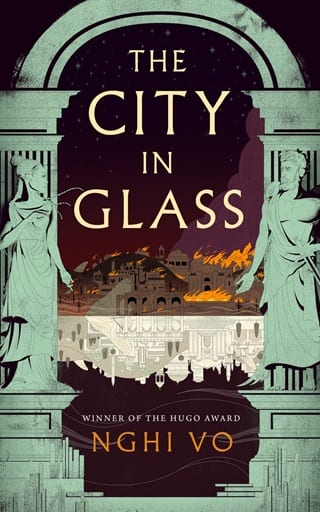Chapter Nine
NINE
The rains came, and this year, they brought with them a cold that sank into Vitrine’s bones. She had come from much warmer places, where the rain was a blessing because it took over the world completely and deeply and only for a handful of days. In those lands, the rains came down as if they loved the land, and the land opened to take them, greedily draining the water until the cereus and the jade plants burst into bloom, unable to help themselves.
The rains of Azril were heavy and soaking, turning her hair and her clothes into weights that might drown her, and so she went up into the anchoresses’ cells that bit into the high cliffs.
The rope ladders and pulley systems would have rotted away by now even without the work of the angels, so Vitrine scaled the cliff like a spider, her fingers finding holds in the sheer rock.
The lower cells were large and spacious, chipped away by decades of women who had found their place easily and swiftly. Vitrine ignored them, climbing to the narrow uppermost cells, the ones that sometimes had to be entered with a stooped back, or, if the anchoress in question was very tall, perhaps on her knees. The upper cells were bare of the comforts offered closer to the ground. They dug deep into the cliff, long eyebolt tunnels that would open to an animal-like burrow at the end.
Vitrine crawled to the very rear of the cell she chose and still she could hear the rain pelting down, swelling the river by increments, drowning the streets. If Azril was as it had been, it would be full of people, unhappy to be out, unhappy to be kept in, selling all manner of physics and remedies for the aches the turn of the weather brought on. There would be children playing in the overflowing fountains, risking their lives by swimming in the sea, catching golden fish that might grant them wishes and falling in love with the mermaids who occasionally washed up after the storms.
In the darkness, Vitrine pulled out her book, the first time she had touched it in a long while. It felt strange in her hands, almost revolting. It felt like holding a dead person, and in a way, she was. She was holding thousands of dead people, and the mellow softness of their rotting bodies and the spar-sharpness of their bones turned her stomach.
Then she remembered that even if it was rotten, it was hers, and she hugged the book to her chest, her shoulders heaving in a heavy sob and then another.
She cried like the rain did, relentlessly and without fury, just the idiot fall of water that slid down her cheeks as if she were as indifferent as rock.
One of her siblings, short, fat, almost rectangular with hands like cenotaphs, lived in the heart of a mountain, and long ago, they had filled the tunnel in after themself. They were the warm heart at the center of the stone, and when Vitrine lay down on the slope and pushed her ear to the rock, she could detect a sweet and constant thrum, their joy and content passed through silica and shale.
That could be me, Vitrine thought, hugging her book tighter. I would be the heart of the mountain and I would pull it closed after me. Perhaps when I woke up, the wheel of time would grow bored of rolling forward and instead it would roll back. I would walk backwards down the slope and find my Azril just as it was.
She closed her eyes tight and tried to believe her own lies, but belief would not come, and neither would sleep. Instead she only cried, and when she grew too cold, she tore a page out of her book and lit it with a puff of her breath. It was as dry as good tinder, and it lit up immediately, a bright flare with a blue lip at the base. Vitrine caught a glimpse of what she had written on the page—a recipe from Noor for goose stuffed with spiced fried barley, olives, and raisins—and then it was gone.
She tasted the savory greasiness of the goose, sharpened by the brined olives and then softened by the plump raisins—and then it was gone. Less one page, her book was lighter, and she reached for another one. When she tore it out, she saw it was a list of songs sung in the galleries of the western mansions. It tickled her that the tunes played by the serious young heirs to the city were lifted up from the genius of one man who worked the brothels and the stews, singing his clever songs to draw in the patrons with money. He was no lyricist, constantly rhyming bandy with randy, but his tunes were haunting, ghosts from another time, the past or a future that was too bright to even dream of. Those she had stolen and set to poetry from a twenty-years-dead girl who had churned them out by the yard for lovers with passion and money but no rhyming talent.
The paper went up, and Vitrine almost moaned at how warm it was. For just an instant, she felt as light as the ash that coated her fingers, light enough to reach for a third page and then a fourth.
Her book was large and heavy. She had many pages to go through, but it would never have lasted forever. It might not even have lasted the day, but the angel spoke up from the mouth of the tunnel.
“What are you doing in there?” he asked.
She scowled, the ashes of a family of apothecaries who specialized in mixing ink floating down around her. They had come originally from Padri with a recipe for a thin springtime green stolen from the guild there. With the seafarers and thieves of Azril just beyond their doorstep, they had developed a gorgeous and extraordinarily pricey peacock blue, a bold fuchsia that smelled like roses, and a green based off their stolen darling that stung the fingers in wordless reprimand when someone wrote lies. Their page was bright with lapis and orpiment and cinnabar, and when it burned, it filled the cell with caustic smoke.
“What do you care what I’m doing?” she asked, and then she wished that she had said something that made her sound a little less like a petulant child.
“I love you,” he said impatiently. “Of course I want to know what you are doing.”
His blunt words surprised a laugh out of Vitrine, hiccupping and sharp in her chest after the tears. It tasted of chemical ash, but it was still a laugh, and she shook her head.
“Oh, by all the mansions beneath the earth and all the clever ones who live in them,” she said. “You are ridiculous.”
“If I am ridiculous, it is only because you have made me so,” he said.
There was a deliberate scrape of a sandal on the rock, a concession for her, she knew. He could be as silent as she was, and she considered this small courtesy as he approached.
He is tall enough he has to stoop, she thought idly. If I had my sister Oroba’s sword, I could cut his head off.
She had no sword, and even if she did, she was suddenly afraid that she was too cold to wield it. It had nothing to do with her stiff fingers or the aching muscles that locked in the chill. It was something deeper that told her that perhaps she could bear it best if she was only still, only stone. She thought she might do anything to be truly warm again.
The angel emerged into the chamber just as the next page, dedicated wholly to a remarkable person who had shown themself at the sideshow and turned the money from that into a mansion, burnt to the end. At the last, the flame leaped up ruddy gold like Sophronia’s hair had been, and extinguished with a resentful hiss. Vitrine caught a glimpse of the angel’s face, and then the eradicating dark put them both out. Neither of them might have been there at all, and Vitrine thought about where else they might be instead. Perhaps she would still be on the low dry fields, cursing the bulls to attack one another so that their blood fell to the ground and grew soldiers. Perhaps the angel would be with his own kind, someplace empty, someplace clean.
Instead they were here inside the mountain, and after a moment, she heard him come to sit down before her. In the dark, Vitrine suspected he looked less like a man, more like what he had been before there were things to speak with and commands to be issued. Without her eyes to interfere, he felt like a gathering storm.
She started to tear another page from her book, but his hand came out to grasp hers. It was gentle, but she jerked her hand back as if he had clawed her, clapping her book shut and clutching it to her chest.
“You should not burn your book.”
“It’s mine. I may do what I like with it.”
He snorted.
“Even children know not to break their own toys.”
“You have not known many children, and it is not a toy.”
She slid it back into the glass cabinet in her heart, and immediately a tide of relief swelled over her. Safe, as safe as she could make anything, and she sat for a moment with her arms wrapped around her body, clutching herself tight. It was warmer with her book inside her rather than set on fire, and she stared through the darkness to where the angel sat.
“I know you like destroying things very well. Why would you stop me?”
“I wouldn’t destroy something that was mine,” he said with a scornful note in his voice.
“Then what is yours?”
A long silence. The darkness shifted in front of her, perhaps as if he were shaking his head, perhaps as if his hands twisted together restlessly in his lap.
“Properly, nothing. We are forbidden gifts or payment. What we have, we have from the start.”
“Except you.”
She reached for him, and without sight, she touched his shoulder, slid her fingers down to the left side of his chest. Vitrine considered, and then she dug her taloned fingers into the scarring over his heart, seeking the flesh to rip it open. The angel grunted with pain, one hand coming up to wrap around her wrist, but he didn’t stop her. She tolerated the grasp of his fingers to feel the way they trembled, and she did not withdraw her claws from his skin until his blood soaked into the fibers of his shirt, mingling with the rain, plastering it to his body.
He held on when she pulled back, only releasing her when she shook him off, and the sound he made, angry and exalted—she could feel it in his blood, that part of him that needed her—went straight to her core. It could crack glass, it could spill ink, and she leaned back against the rock wall.
“Go. Leave.”
She heard the angel sigh like the sound of a wind rushing down a narrow valley. There was no other sound, but there was suddenly more space around her, more air to breathe.
She slept for a while, and when she woke up, the air was drier, and she could no longer hear the rains outside. Vitrine realized that she had slept them out, and perhaps that was a mercy.
She made her way out of the tunnel, and she yelped when she almost tripped over the angel, who was sitting on the ledge. He turned to look at her, his face solemn.
“You are awake. I thought you might wait out the year.”
“I still might,” she said stubbornly. “Why are you still here?”
“You know the answer to that.”
He no longer sounded angry about it, which disturbed her in a way that she couldn’t quite define. He was tired, it was written in every line of his face. He was impatient, as she could tell from the hoarse catch in his voice. He was lonely, which she had not guessed angels might be when they were apart from their own kind. He was not angry, and she scowled.
“You deserve it. You should not have destroyed my city.”
Instead of responding, he turned towards the ruins again.
“You have a great deal of work to do. What comes next?”
He reminded her that once, one of the noble families had caused to be built a colonnade where each of the supporting pillars was an angel carved from marble. They were not real angels, of course, only even-featured, blank-eyed men and women in draping robes carrying the weight of the entablature on their noble heads. Real angels came like a storm, like a nightmare, like the end of the world, and he looked a little less like them now, a little more like a patient stone statue that bore the firmament on his head.
“You don’t look much like an angel anymore,” she said, refusing to give him the pleasure of knowing how he resembled something she had once loved in Azril.
“I am an angel. That is exactly what I look like. And I ask you. What comes next?”
There was a part of her that wanted to tell him to rot in the anchoress cells. Enough women had, the ones who were imprisoned in the cliffs rather than choosing them willingly. Sometimes the lower cells flooded towards the rear, filling with silted water that rotted the skin off their feet.
Instead, she looked down at the city, her work barely a dent in what would need to be done, and then she looked back at the angel, a storm, a disaster, pure and noble power shaped to look like a handsome man.
“Next, I go home.”
Wordlessly, he followed her down the cliff, his wings spread like a sheltering shadow over her as she descended in the form of a black kite.
 Fullepub
Fullepub 



